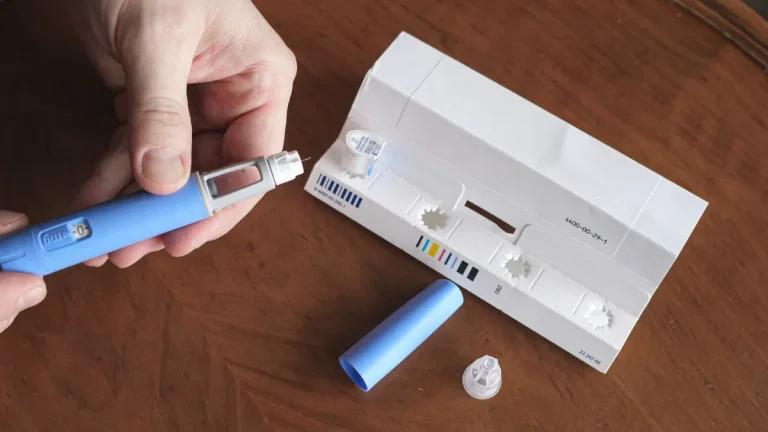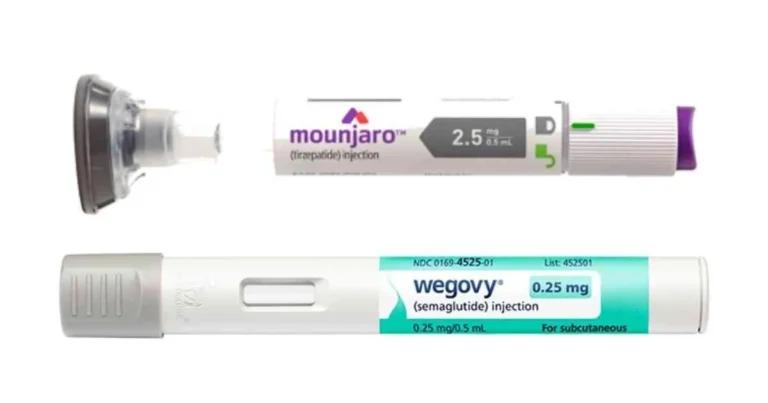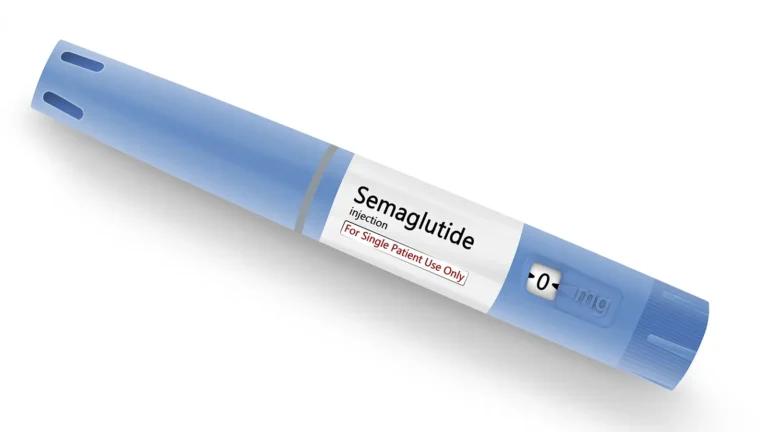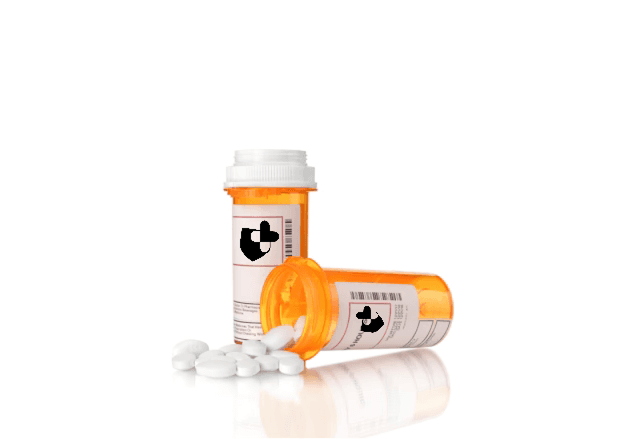Are you wondering what are the new weight loss medications? This guide covers the latest developments in weight loss drugs, from daily tablets to weekly injections. Discover what’s new and how these medications can help you manage your weight.
Key Takeaways
- Oral semaglutide is a promising new weight loss medication, expected to be the first oral GLP-1 treatment for obesity, demonstrating significant efficacy in clinical trials with a potential weight loss of up to 15%.
- Several other innovative oral and injectable weight loss medications, including orforglipron, danuglipron, and mazdutide, are in development or clinical trials, offering various mechanisms and promising results for weight loss and diabetes management.
- Insurance coverage for weight loss drugs remains variable, with a growing trend among employers recognizing the importance of these medications for overall employee health gains, therefore reducing long term costs to employers.

An overview of expected approval dates for weight loss medications currently in clinical trials
Oral Semaglutide: A New Daily Weight Loss Tablet
Oral semaglutide, a groundbreaking weight loss drug, is classified as a GLP-1 agonist and is set to transform the landscape of obesity treatment. Developed by Novo Nordisk, this once-daily tablet is expected to receive FDA approval soon and become the first oral GLP-1 treatment for obesity. As an oral alternative to injectables like Wegovy, semaglutide offers a convenient solution for those seeking to lose weight and manage obesity-related conditions.
The journey to reaching the optimal dose of semaglutide involves a gradual increase over 16 to 20 weeks, ultimately aiming for a 2.4 mg daily dose. This method ensures that the body adjusts to the medication, maximizing its efficacy while minimizing potential side effects.
With the potential to significantly aid in chronic weight management, oral semaglutide is poised to become one of the top weight loss medications in the market.
Clinical Trials and Effectiveness
Clinical trials have demonstrated the effectiveness of oral semaglutide in managing obesity and aiding weight loss. In a phase 3 study, participants experienced a remarkable weight loss of up to 15% of their initial body weight, showcasing the drug’s potential to significantly impact weight management in individuals with Type 2 diabetes. Another study involving 307 adults highlighted the drug’s effectiveness in reducing weight and managing diabetes.
However, like many prescription drugs, oral semaglutide comes with its share of side effects. Common issues include nausea, diarrhea, abdominal pain, and vomiting, which are typical of GLP-1 agonists.
Despite these side effects, the overall benefits in weight and diabetes control make oral semaglutide a promising addition to the arsenal of weight loss medications.
Orforglipron: An Affordable Oral GLP-1 Agonist

A representation of an affordable oral GLP-1 agonist medication, Orforglipron.
Orforglipron is another exciting development in the realm of weight loss drugs. As an affordable oral GLP-1 agonist, orforglipron is administered once daily as an oral capsule, offering a convenient and cost-effective solution for weight management. Its potential for significant weight reduction over placebo makes it a promising candidate in the fight against obesity.
Currently in phase 3 clinical trials and due to be approved in 2026, orforglipron is being closely studied for its effectiveness and affordability. As the demand for accessible diabetes medications and weight loss treatments grows, orforglipron’s affordability could make it a widely used option for individuals seeking to lose weight and manage diabetes.
Recent Findings on Orforglipron
Recent findings on orforglipron have shown promising results. Patients taking orforglipron experienced an average weight loss of approximately 6.14 kg compared to those on placebo. Additionally, a systematic review found that patients on orforglipron had significantly better weight loss outcomes, achieving reductions of 5%, 10%, and 15%.
However, gastrointestinal side effects were more common among orforglipron users, highlighting the need for further research to ensure its safety and effectiveness in patients with severe gastrointestinal disease and issues related to the gastrointestinal tract.
Danuglipron: The Twice-Daily GLP-1 Pill
Danuglipron, an oral GLP-1 receptor agonist, is designed for chronic weight management and is administered as a twice-daily oral tablet. Clinical studies have shown that danuglipron can achieve up to 13% weight loss effectiveness over a 32-week period, making it a compelling option for those seeking new weight loss medications.
Development Updates on Danuglipron
However, due to potential liver toxicity effects, Pfizer, the developer of danuglipron, has discontinued its efforts to license the drug candidate.
APHD-012: Mimicking Gastric Bypass Effects
APHD-012 is an innovative oral medication designed to mimic the metabolic effects of gastric bypass surgery, offering a less invasive alternative for weight loss and glucose control. Administered once daily, APHD-012 aims to provide significant benefits in weight management and diabetes control without the need for surgery.
Initial effectiveness data for APHD-012 is expected by the end of 2024 following the completion of phase 2 trials. This drug’s potential to simulate the effects of gastric bypass surgery could revolutionize obesity treatment, providing a valuable tool for those struggling with severe obesity and related health conditions.
Promising Results of APHD-012
The phase 2 trials of APHD-012 have shown promising results, significantly improving glucose tolerance in prediabetes patients. The study found that APHD-012 was well tolerated overall, indicating its potential for wider use.
As an innovative oral glucose medication, APHD-012 holds promise for improving glucose tolerance and weight management.
ARD-101: Appetite-Suppressing Weight Loss Drug

An appetite-suppressing weight loss drug, ARD-101, designed to help people lose weight.
ARD-101 is an oral medication that targets bitter taste receptors to suppress appetite, making it a unique addition to the list of weight loss drugs. Taken as an oral pill twice daily, ARD-101 has shown to reduce hunger 2.5 times more than placebo, potentially helping patients lose weight more effectively.
Early clinical trials of ARD-101 have shown promise in significantly mitigating hunger and decreased appetite in patients with Prader-Willi Syndrome, a condition characterized by chronic hunger and obesity. This drug’s potential to regulate appetite and aid in weight management makes it an exciting development in the field of obesity treatment.
FDA Designations for ARD-101
The FDA approves ARD-101 Orphan Drug designation and Rare Pediatric Disease designation for its potential to treat Prader-Willi Syndrome. These designations recognize the drug’s potential based on preliminary trial results and highlight its importance in treating this rare and challenging condition.
Amycretin: A New Oral Weight Management Drug
Amycretin, an oral GLP-1 and amylin agonist, has shown an impressive average of 13% weight loss in phase 1 trials. This new weight loss drug, expected to be available before 2030, offers a promising option for those seeking effective weight management solutions. Amycretin’s dual agonist mechanism helps regulate appetite and improve glucose control, making it a valuable tool in treating obesity and related conditions.
With phase 2 studies set to begin in the second half of 2024, Amycretin’s potential to help people lose weight and manage diabetes is eagerly anticipated. This drug’s combination of efficacy and convenience positions it as a significant player in the future of weight loss medications.
Safety Profile of Amycretin
The safety profile of Amycretin, based on phase 1 trials, indicates primarily mild to moderate gastrointestinal side effects, similar to other incretin-based treatments. Importantly, no severe side effects were linked to Amycretin during these trials, suggesting a favorable safety profile.
Ongoing safety studies are planned to further evaluate and confirm the long-term safety of Amycretin.
Monlunabant: Effective but with Side Effects
Monlunabant, a weight loss drug used for chronic weight management and metabolic disorders, has shown promising results in clinical trials but comes with notable side effects. Participants in the phase 2 trial lost an average of 7 kg (15 lbs) after 16 weeks, significantly more than the placebo group. However, the drug is associated with mild to moderate gastrointestinal side effects, as well as potential brain-related side effects such as irritability, anxiety, and sleep troubles.
Despite these side effects, Monlunabant’s effectiveness in promoting weight loss makes it a valuable option for those struggling with obesity. The ongoing evaluation of Monlunabant aims to optimize its benefits while minimizing adverse effects, ensuring it remains a viable choice for long-term weight management.
Ongoing Evaluation of Monlunabant
The ongoing evaluation of Monlunabant in upcoming studies is crucial to fully understand its safety and effectiveness. These studies will provide further insights into the drug’s long-term impact and help refine its use in clinical practice.
GSBR-1290: Oral GLP-1 for Weight Management
GSBR-1290 is an oral GLP-1 agonist. It targets chronic weight management and the treatment of Type 2 diabetes. Administered once daily, GSBR-1290 offers a convenient alternative to injectable treatments, making it easier for patients to adhere to their weight loss regimen. In a Phase 2a trial, GSBR-1290 resulted in a significant weight loss of 6.2% after 12 weeks, outperforming the placebo group.
Additionally, 67% of participants treated with GSBR-1290 achieved at least a 6% reduction in weight within the 12-week study period. This impressive outcome highlights the drug’s potential to significantly aid in weight management and diabetes control.
Retatrutide: Injectable Targeting Multiple Receptors
Retatrutide, an injectable weight loss drug, targets multiple receptors including GIP, GLP-1, and glucagon receptors, offering a comprehensive approach to weight loss and metabolic health. Expected to provide up to 24% weight loss after 11 months, Retatrutide is administered once weekly, making it a convenient option for patients.
The phase 3 weight loss study for Retatrutide is expected to finish in early 2026, paving the way for its potential approval and widespread use.
Additional Benefits of Retatrutide
In addition to significant weight loss, Retatrutide has shown promise in improving metabolic dysfunction-associated steatohepatitis (MASLD). Initial phase 2 trials indicated that Retatrutide may lead to significant liver fat reduction in participants, addressing a common complication associated with obesity.
The drug’s ability to treat conditions like MASLD further enhances its value in the realm of weight management and metabolic health.
CagriSema: Combining Cagrilintide and Semaglutide
CagriSema is a combination of cagrilintide and semaglutide, two powerful agents known for their weight loss and metabolic benefits. This combination therapy is expected to achieve a 15% reduction in body weight after 32 weeks, offering a significant improvement over existing treatments. Clinical trials for CagriSema began in November 2022 and are projected to run through October 2026, with the drug administered under the skin once weekly.
The combination of these two drugs aims to leverage their complementary mechanisms, maximizing weight loss and metabolic control. As the trials progress, CagriSema could become a key player in the field of obesity treatment, offering a potent option for individuals struggling to lose weight.
Comparative Studies of CagriSema
Comparative studies of CagriSema have shown that it results in significantly more weight loss than either cagrilintide or semaglutide alone. The phase 3 study aims to compare the safety and effectiveness of CagriSema with Zepbound, another leading weight loss medication.
This study is expected to conclude in late 2025, providing critical data on CagriSema’s potential as a superior weight loss treatment.
Ecnoglutide: Weekly Injectable GLP-1 Agonist
Ecnoglutide, a weekly injectable GLP-1 agonist, has demonstrated significant mean reductions in body weight, ranging from 1.57 kg to 2.26 kg at the end of the treatment period. This drug offers a promising option for those seeking effective weight management solutions with a once-weekly administration schedule.
Clinical trials have shown that 33.3% of participants achieved at least a 5% weight loss with 1.2 mg of ecnoglutide, compared to only 3.0% in the placebo group. The safety profile of ecnoglutide is consistent with existing GLP-1 analogs, with no severe adverse events reported, making it a safe and effective option for weight loss and diabetes management.
Mazdutide: Promising for Weight Loss and Diabetes
Mazdutide, an innovative treatment for weight loss and Type 2 diabetes, has shown promising results in recent phase 3 studies. Patients taking Mazdutide experienced an average weight loss of 7% to 9%, and the drug outperformed Trulicity in both weight loss and A1C reduction. More individuals using Mazdutide achieved an A1C percentage of 6.5% or lower, highlighting its effectiveness in diabetes control and its potential to treat type 2 diabetes.
Administered as an injectable under the skin once weekly, Mazdutide offers a convenient and effective solution for weight management and diabetes. The ongoing phase 3 studies in China are expected to run through 2024 and 2025, providing further insights into its long-term benefits and safety.
Survodutide: GLP-1 and Glucagon Receptor Activator
Survodutide is a dual agonist targeting both GLP-1 and glucagon receptors, enhancing its weight loss effects. In phase 2 trials, Survodutide demonstrated up to 19% weight loss, making it one of the most effective new weight loss drugs. The flexibility in dosing allows for better management of adverse effects, ensuring a safer treatment protocol.
Survodutide is designed for weekly administration, facilitating easier treatment adherence. The upcoming SYNCHRONIZE-2 trial will focus specifically on individuals with Type 2 diabetes, aiming to assess the drug’s efficacy and safety in this population.
VK2735: Dual GLP-1/GIP Agonist
VK2735 is a dual GLP-1/GIP agonist medication designed to activate both GLP-1 and GIP receptors, aiming to improve weight loss outcomes. In a phase 2 trial, VK2735 showed nearly 15% weight loss after 13 weeks, with up to 88% of participants achieving a weight loss of at least 10%. The trial enrolled 176 participants, surpassing the initial target of 125 due to increased interest.
Administered by injection under the skin once weekly, VK2735 offers a convenient option for those looking to lose weight and manage Type 2 diabetes. The phase 2 trial is expected to start in the second half of 2024, providing more data on its effectiveness and safety.
MariTide: Monthly Injectable Weight Loss Drug
MariTide is an innovative weight loss medication administered through a monthly injection under the skin, mimicking GLP-1 and blocking GIP. In the phase 1 study, MariTide showed a weight loss of nearly 15% of initial body weight after 3 months, with results persisting for approximately 5 months after the last dose.
Currently enrolled in phase 2 clinical trials, MariTide is expected to conclude by late 2024, with future studies in phase 3 focusing on obesity and its associated conditions, including heart, liver, and kidney diseases. This monthly injectable offers a convenient and effective solution for long-term weight management.
Bimagrumab: For Weight Loss and Muscle Growth
Bimagrumab is a biologic injectable that shows promise for both weight loss and muscle growth. Phase 2 studies indicate significant findings supporting its effectiveness in promoting weight loss and increase muscle mass, making it a unique option among weight loss drugs.
The dual benefits of weight loss and muscle growth position Bimagrumab as a valuable treatment for individuals looking to improve their overall health and body composition. As more data becomes available, Bimagrumab could become a key player in the field of weight management and muscle enhancement.
Existing FDA-Approved Weight Loss Medications
Several FDA-approved weight loss medications, including prescription weight loss medications, are already available, including:
- Orlistat
- Phentermine-topiramate
- Naltrexone-bupropion
- Liraglutide
- Semaglutide
- Tirzepatide
These medications offer various mechanisms and benefits, helping individuals achieve significant weight loss and manage excess weight-related health conditions to treat obesity.
For example, Zepbound (tirzepatide) can lead to an average weight loss of 12% to 18%, depending on individual conditions. Combining these medications with a healthy eating plan and exercise can enhance their effectiveness, providing a comprehensive approach to weight management.
Off-Label Use of Medications for Weight Loss
Medications are frequently prescribed off-label for weight loss. This is due to their ability to induce weight loss as a side effect. It is essential to consult with a healthcare professional before taking prescription medications for weight loss purposes to ensure safety and effectiveness. Some insurance providers may cover weight loss drugs if prescribed for conditions like Type 2 diabetes.
The potential passing of the Treat and Reduce Obesity Act could lead to broader Medicare coverage for weight loss medications, making these treatments more accessible to those in need. This legislative change could significantly impact the availability and affordability of weight loss medications, as highlighted by the obesity medicine association.
Integrating Weight Loss Medications with Lifestyle Changes
Combining anti-obesity medications with healthy lifestyle changes yields better weight loss results than relying on lifestyle changes alone. Healthcare professionals can offer guidance on necessary lifestyle modifications while on weight-loss medications, ensuring a comprehensive approach to weight management.
Participants taking Mazdutide, for example, experienced significant improvements in multiple cardiometabolic risk factors, including reductions in high blood pressure and triglycerides. A team approach, including physicians and specialists, is crucial for effective weight management and medication adherence, particularly in the context of cardiovascular disease and heart disease.
Potential Side Effects and Considerations
Common side effects of weight loss medications include gastrointestinal symptoms such as nausea, which occurs in about 44% of users, and general symptoms like headache and fatigue. High discontinuation rates due to side effects for medications like semaglutide and liraglutide can be as high as 7% within the first year. Serious side effects, including potential kidney failure and pancreatitis, are associated with tirzepatide use, necessitating careful monitoring.
Orforglipron users reported a higher incidence of nausea, vomiting, and constipation compared to placebo treatments. The safety profile of amycretin shows primarily mild to moderate gastrointestinal issues, similar to other incretin-based treatments. Understanding these potential side effects and considering them in treatment plans is essential for safe and effective weight management.
Insurance Coverage for New Weight Loss Drugs

Insurance coverage for new weight loss drugs, highlighting the financial aspect of weight management.
Insurance coverage for weight loss medications varies significantly among different insurance plans. Medicare does not typically pay for medications prescribed solely for weight loss, but certain large employers are beginning to offer coverage for GLP-1 agonists used for weight loss. This trend indicates a growing recognition of the importance of weight loss medications in managing obesity and related health conditions.
The ongoing regulatory review for Mazdutide’s new drug application in China aims to provide a medication for chronic weight management, potentially expanding insurance coverage for this and similar drugs. As more weight loss medications receive approval and recognition, insurance coverage is expected to improve, making these treatments more accessible to those in need.
Comparing Costs of New Weight Loss Medications
The cost of new weight loss medications can be a significant barrier for many individuals. Recent studies indicate that both semaglutide and tirzepatide are priced excessively high, requiring significant reductions to be deemed cost-effective. For tirzepatide to meet cost-effectiveness standards, its price must be reduced by over 30%, while semaglutide’s price needs an 82% cut.
Cheaper alternatives like phentermine-topiramate and naltrexone-bupropion offer more affordable options, with estimated net prices of $1,786 and $420 respectively. Comparing costs and effectiveness is crucial for making informed decisions about weight loss treatments, ensuring that patients can access the most suitable and affordable options.
Summary
In conclusion, the landscape of weight loss medications is rapidly evolving, offering new and promising options for individuals seeking to manage their weight and improve their health. From oral tablets like semaglutide and orforglipron to injectables like Retatrutide and CagriSema, these drugs provide diverse solutions for weight management. As research continues and new treatments receive approval, the future of weight loss looks brighter, offering hope and effective options for those battling obesity.
Frequently Asked Questions
What is the most effective new weight loss medication?
Retatrutide has emerged as one of the most effective new weight loss medications, demonstrating potential weight loss of up to 24% after 11 months. This efficacy positions it as a leading option for those seeking significant weight loss results.
Are there any oral weight loss medications available?
Yes, oral weight loss medications such as Semaglutide and Orforglipron are available and provide both convenience and effectiveness in weight management.
What are the common side effects of GLP-1 agonists?
Common side effects of GLP-1 agonists include gastrointestinal symptoms such as nausea, diarrhea, and abdominal pain. It’s important to monitor these reactions during treatment.
Will insurance cover new weight loss medications?
Insurance coverage for new weight loss medications, such as GLP-1 agonists, varies by plan, though some large employers are starting to include these treatments in their coverage options. It is advisable to check with your specific insurance provider for details on your plan.
How do weight loss medications work with lifestyle changes?
Weight loss medications significantly enhance the effectiveness of lifestyle changes, such as a balanced diet and increased physical activity, leading to improved outcomes. Therefore, incorporating both approaches is recommended for optimal weight loss results.
Medical Disclaimer
NowPatient has taken all reasonable steps to ensure that all material is factually accurate, complete, and current. However, the knowledge and experience of a qualified healthcare professional should always be sought after instead of using the information on this page. Before taking any drug, you should always speak to your doctor or another qualified healthcare provider.
The information provided here about medications is subject to change and is not meant to include all uses, precautions, warnings, directions, drug interactions, allergic reactions, or negative effects. The absence of warnings or other information for a particular medication does not imply that the medication or medication combination is appropriate for all patients or for all possible purposes.















